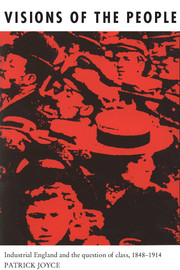Book contents
- Frontmatter
- Contents
- List of plates
- Acknowledgements
- 1 Introduction: beyond class?
- PART I POWER AND THE PEOPLE: POLITICS AND THE SOCIAL ORDER
- PART II MORALISING THE MARKET: WORK AND THE SOCIAL ORDER
- PART III CUSTOM, HISTORY, LANGUAGE: POPULAR CULTURE AND THE SOCIAL ORDER
- PART IV KINGDOMS OF THE MIND: THE IMAGINARY CONSTITUTION OF THE SOCIAL ORDER
- Appendices
- 1 The Political Pulpit. A Sermon, 1839, (Extract)
- 2 Memory Sketches (Oldham, 1887)
- 3 Speech on Blackstone Edge, 1846 (Extract)
- 4 Speech at Manchester, 1866 (Extract)
- 5 Speech at the Public Hall, Warrington, 1868 (Extract)
- 6 McDouall's Chartist and Republican Journal, 1841 (Extract)
- 7 Short Time Committee Placards
- 8 ‘Our Merry Town’, Pearson Collection
- 9 ‘Rich and Poor’, Pearson Collection
- 10 Extract from the preface of the Weyver's Awn Comic Olmenack, 1881
- 11 Extract from the 1885 Weyver's Awn
- 12 Extract from Bob Stubbs' Yorksher Awmynack, preface and entry for March 1910
- 13 Cover and extract from Tommy Toddles' Comic Almenac, 1875
- 14 An example of Sussex dialect literature
- 15 Welcome, bonny brid
- 16 A Royal Visit, 1896
- 17 Eawr Folk
- 18 Bowton's Yard
- 19 Cotton Fowd
- 20 Title page and opening of a ‘Tum Fowt’ sketch
- Bibliographical note
- Notes
- Index
5 - Speech at the Public Hall, Warrington, 1868 (Extract)
Published online by Cambridge University Press: 05 March 2012
- Frontmatter
- Contents
- List of plates
- Acknowledgements
- 1 Introduction: beyond class?
- PART I POWER AND THE PEOPLE: POLITICS AND THE SOCIAL ORDER
- PART II MORALISING THE MARKET: WORK AND THE SOCIAL ORDER
- PART III CUSTOM, HISTORY, LANGUAGE: POPULAR CULTURE AND THE SOCIAL ORDER
- PART IV KINGDOMS OF THE MIND: THE IMAGINARY CONSTITUTION OF THE SOCIAL ORDER
- Appendices
- 1 The Political Pulpit. A Sermon, 1839, (Extract)
- 2 Memory Sketches (Oldham, 1887)
- 3 Speech on Blackstone Edge, 1846 (Extract)
- 4 Speech at Manchester, 1866 (Extract)
- 5 Speech at the Public Hall, Warrington, 1868 (Extract)
- 6 McDouall's Chartist and Republican Journal, 1841 (Extract)
- 7 Short Time Committee Placards
- 8 ‘Our Merry Town’, Pearson Collection
- 9 ‘Rich and Poor’, Pearson Collection
- 10 Extract from the preface of the Weyver's Awn Comic Olmenack, 1881
- 11 Extract from the 1885 Weyver's Awn
- 12 Extract from Bob Stubbs' Yorksher Awmynack, preface and entry for March 1910
- 13 Cover and extract from Tommy Toddles' Comic Almenac, 1875
- 14 An example of Sussex dialect literature
- 15 Welcome, bonny brid
- 16 A Royal Visit, 1896
- 17 Eawr Folk
- 18 Bowton's Yard
- 19 Cotton Fowd
- 20 Title page and opening of a ‘Tum Fowt’ sketch
- Bibliographical note
- Notes
- Index
Summary
Long before the hour fixed for the meeting the approaches to the hall and the neighbouring streets were thronged by large and excited crowds. It is many years since there has been a contested election for the borough of Warrington, and the combination of town and county contests has created an extraordinary degree of excitement. The hall is large, airy, and comfortable, but, 2500 tickets having been issued, the space was tested to the utmost. The gallery had been allotted to the county voters, of whom between 300 and 400 were present. In the body of the hall the audience, standing, were most densely packed. During the interval which elapsed between the opening of the doors and the commencement of the proceedings, the rather incommoded audience preserved excellent temper, which was certainly humoured by judicious selections played on the organ. When the organist ventured on ‘Tramp, Tramp’, the chorus was taken up with great vigour and effect. Across the ceiling in front of the platform was a large flag bearing the words ‘Welcome to Gladstone and Grenfell’ in red letters. A noticeable feature of the arrangements, and one deserving of imitation elsewhere, was the excellent accommodation provided for the press. Over fifty reporters were present and the table space was ample. Punctually to the minute the candidates appeared, and were received with longcontinued and vehement applause, the organ playing ‘See the conquering hero comes’. … The chairman said he thought the sight of that meeting must be most gratifying to all who had the welfare of the nation at heart.
- Type
- Chapter
- Information
- Visions of the PeopleIndustrial England and the Question of Class, c.1848–1914, pp. 357 - 359Publisher: Cambridge University PressPrint publication year: 1991



